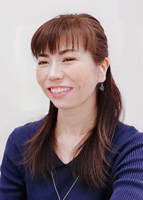Disaster Support and Sorting Belongings Yukimi Taira (Representative Director of Izumiotsu Development Support Study Group Lien, General Incorporated Association)

On November 22nd this year, I will be celebrating my 20th year as a mother. I have been blessed with two unique children, one with autism spectrum disorder and the other with attention deficit hyperactivity disorder.
Twenty years have passed since the Act on Support for Persons with Developmental Disabilities was enacted in 2004.
During this time, developmental disorders have been added to various laws related to disabilities, and they have been featured in various media. Words such as inclusiveness and diversity have also become more common, and the acceptance of diversity has become a philosophy in various places, such as companies, schools, and communities.
The non-profit organization I represent is what is known as a “parents’ association.” The predecessor voluntary organization was established in 2014. Having learned about autism spectrum disorder and used that knowledge in raising children, I received a request from fellow parents to start the organization.
Since becoming a corporation, we have been working on three pillars, including parent support, community awareness, and collaboration with other organizations, and this year marks our fifth year.
Now, let’s have a common understanding of developmental disorders.
[Developmental disorders are innate brain characteristics and uniqueness that become apparent during the developmental period and can lead to difficulties in raising children. They are classified as intellectual disability (ID), autism spectrum disorder (ASD), attention deficit hyperactivity disorder (ADHD), specific learning disorder (SLD), and developmental coordination disorder (DCD). ASD is characterized by social interaction, social communication, social imagination, and sensory bias, while ADHD is characterized by inattention, impulsivity, and hyperactivity. SLD causes difficulties in learning areas (reading, writing, and arithmetic) that cannot be explained by intellectual ability. DCD is characterized by clumsiness that is more pronounced than expected for the chronological age, affecting daily life.]
Imagine this. If the above description applies to a close family member, what would you think immediately? It may be common to think, “Just how much does it affect parenting and daily life?” or “It’s a bit worrying, but it’s probably okay.”
It may be overlooked because of anxiety about the unknown world of disabilities. And it may force the person involved to make a long-term desperate effort.
When you think about it that way, words like inclusive, diversity, and understanding of diversity that you hear everywhere seem very empty.
Whether each person has a disability characteristic or not, and whether it is severe or mild, I want to be in a relationship where individuals are respected and have an interest based on respect in order to understand each other’s differences. In order to get closer to such a society, I feel the need to change the perspective of individual values and even the culture rooted in each region.
It’s been 20 years since I met my child. I hope that as many people as possible will learn about diverse children, including those with developmental disabilities, and their parenting through this column.
